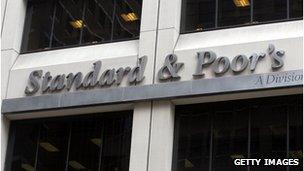S&P’s logical but tactless eurozone warning
- Published
- comments

Standard and Poor's has not endeared itself to EU leaders
The reasons given by Standard and Poor's for warning that it may downgrade the credit ratings of all but one of the eurozone's member governments - the exception being Greece, which already has an exceptionally low junk rating - are in a sense uncontroversial.
As the leading ratings agency points out, eurozone banks have been struggling to borrow, a number of eurozone economies are buckling under the burden of big government and household debts, there is a significant risk of recession, there is a bitter dispute between eurozone leaders about how best to help governments finding it hard to obtain loans, and investors are in general increasingly wary of lending to the eurozone's public sector.
And, as it happens, the best and most sophisticated arguments for downgrading the ratings of all eurozone governments, under the current constitutional arrangements for the currency union, were made in a recent speech by the chairman of the Financial Services Authority, Adair Turner (see my post, The eurozone's borrowing costs may stay lethally high).
It is the timing that is so controversial of announcements that the six financially strongest eurozone governments, including Germany and France, could lose their AAA ratings, and 10 others could see their ratings reduced by relatively more.
Business editor Robert Peston says it's not the analysis of S&P's credit watch warning but rather the timing that's so "shocking"
It comes just as France and Germany reach an agreement intended to subject all eurozone countries to stricter disciplines on what they borrow - and only days before a European Union summit that's intended to come up with a proper solution to the eurozone's crisis.
S&P says it wants eurozone leaders to understand how much is at stake if this week's summit is another damp squib. But if its actions were to set off a panic that were, for example, to tip a bank over the edge, it could be accused of destabilising attempts to reform the eurozone in an orderly way.
Update 08:15, 6 December: As expected, the government bond prices of Italy and Spain have given up some of the gains they made yesterday - so the implicit borrowing costs for these governments has risen.
There has also been weakness in the bond prices of the governments, including Germany and France, in danger of losing their cherished AAA status
That said, as of first thing the influence of S&P has been limited: the borrowing cost for Italy, for example, is still around a percentage point below that penal and unaffordable 7% threshold that it was actually forced to pay recently.
This limited reaction is what you would expect: S&P's analysis is backward-looking, identifying the structural weaknesses in the currency union that have been conspicuous to investors for months and which the eurozone's leaders are trying to solve.
To put it another way, S&P cannot make or break the eurozone; only eurozone governments can do that. And we'll have a better idea by the end of the week whether those governments will go down in history as redeemers or destroyers.